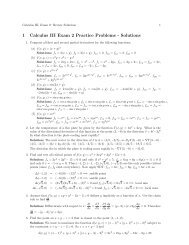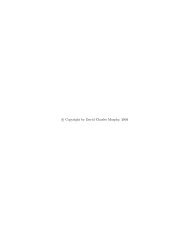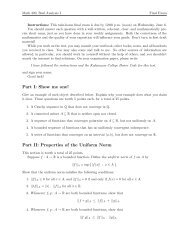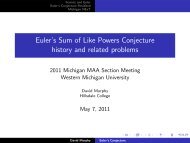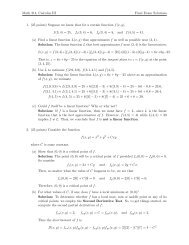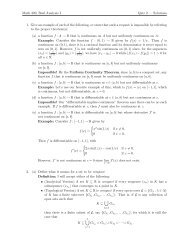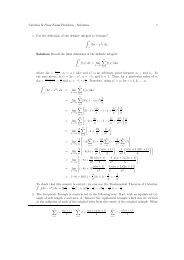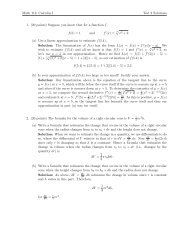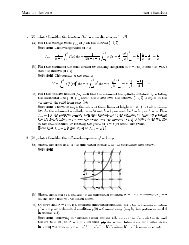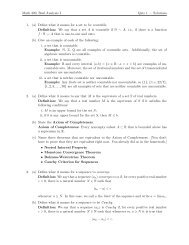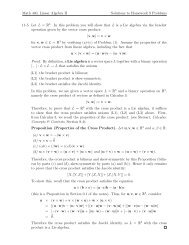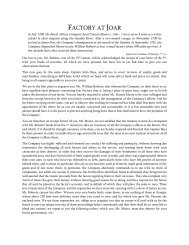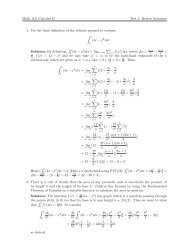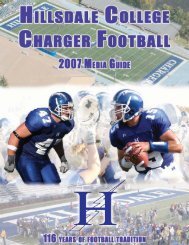Pym, JohnJohn Pym
Pym, JohnJohn Pym
Pym, JohnJohn Pym
Create successful ePaper yourself
Turn your PDF publications into a flip-book with our unique Google optimized e-Paper software.
SPEECH IN PARLIAMENT<br />
John <strong>Pym</strong> (1583–1643), Member of Parliament for Tavistock (1625–1643)<br />
7 November 1640<br />
The distempers of this Kingdom are well known; they need not repetition. For though we have good laws, yet<br />
they want their execution; or if they are executed, it is in a wrong sense. I shall endeavor to apply a remedy to<br />
the breaches that are made, and to that end, I shall discover first the quality of the disease. An actual declaration<br />
of offences needs no statute, and that is a step to reformation.<br />
There is a design to alter the kingdom both in religion and government. This is the highest of treasons! This<br />
blows up by piecemeal, and almost goes through their ends! This concerns the King as well as us, and that I say<br />
with reverence and care of His Majesty.<br />
First, the Papist party's attempt to alter our religion, being obliged by a maxim in their doctrine not only to<br />
maintain their own religion, but to extirpate all others. Their mode is by setting a difference between the King<br />
and his subjects.<br />
The second is the corrupt part of our clergy that make things for their own ends, and wish an union between us<br />
and Rome. The hierarchy cannot amount to the height they aim at without a breach of our law. To which their<br />
religion necessarily joins, that if the one stands, the other must necessarily fall.<br />
Thirdly, agents and pensioners to Spain and other foreign states, who see we cannot comply to them if we<br />
maintain our religion established, which is contrary to theirs. Here they intend chiefly the Spanish white and<br />
gold works, which are of most effect.<br />
Fourthly, favourites—such as are for their own preferments, prize not conscience, and further all bad<br />
things—are worse than Papists. These are willing to run into Popery. Such are our judges, spiritual and<br />
temporal; such are also some of our councillors of state. All these, though severed, yet in their contrivements<br />
they aim at one end. They have proceeded in their motion first softly, now with strides, and if they be not<br />
prevented, they are near their ends, to which their designs walk on five feet. The first foot is: First, ecclesiastical<br />
courts. Secondly, discountenancing preachers that are forward in our religion and persecuting virtuous men<br />
under the law of purity. Thirdly, countenancing persons of contrary dispositions. They must be of their own<br />
party, or else no promotion. Fourthly, by negotiating agents from hence to Rome, and from Rome to this place,<br />
to extirpate our religion. Proof will appear. Fifthly, frequent preaching up the absolute monarchy of kings; as Dr.<br />
Beale 1 and others.<br />
The second foot—policy for the state and courts of justice: First, the council endeavouring to make differences<br />
between the King and people by the political interpretation of the law to serve their turns, and thus to impose<br />
taxes against law with a colour of law. The judges were chidden. A judge said, when a habeas corpus was<br />
applied for, "We granted a habeas corpus in the King's Bench, and we were well chidden for our labour."<br />
Secondly, by keeping the King in constant necessity, that he may seek to their counsels for relief. To this<br />
purpose to keep the Parliaments in distaste, that their counsels may be taken. The King by them is brought to<br />
this, as a woman that used herself to poison could not live with good meat. Search the chronicles and we see no<br />
king that ever used Parliaments was brought to this want. No imputation is to be laid upon the King for any<br />
irregular actions, but upon them that be entrusted. Thirdly, arbitrary proceedings in courts of justice. Law and<br />
precedents are nothing. We have all law left to the conscience of a single man. All courts are now courts of<br />
conscience without conscience. All defence of the subject is now taken away in order to the dissolution of the<br />
Kingdom. Fourthly, plotters to enforce a war between Scotland and us, that when we had well wearied one<br />
1<br />
In 1635 William Beale (–1651), Master of Saint John's College (Cambridge), preached that "taxes and subsidies, tonnage and poundage ...<br />
are the King's absolutely, as absolutely as his Crown and likewise ourselves, our goods, our servants, our children"
another, we might be brought to what scorn they pleased. A sermon was preached in the north before the King<br />
to make an agreement between Popery and our religion. The partition wall must be broken down, which was<br />
the Puritans. The Scots have been the first authors of all. Fifthly, by misguiding the King's approbation.<br />
The third foot: First, the discontent and sudden dissolving of Parliaments and punishing of Parliament men, all<br />
to affright us from speaking what we think. I will not mention the breach of privileges of old, but state<br />
instances in new; as Mr. Crewe's case, 1 who was committed for not delivering up the petitions of the House.<br />
The clerk is bound not to deliver up any petitions, nor so any Member. If there be no safety here, then nowhere!<br />
Secondly, a declaration which slandered our proceedings, as full of lies as leaves, for which I desire reparation.<br />
The King took it upon the credit of others; he never saw it. Thirdly, ingratiating of Papists and saying they are<br />
the best subjects for they contribute money to the war, which the Protestants will not do, so to bring the King<br />
in love with them. Fourthly, by moulding the Irish government into an illegal course, with intent to do so here.<br />
We ought to have interest with them. We are all the same subjects, and this is no new thing.<br />
The fourth foot takes military steps. First, by putting places of importance into the hands of Papists or suspected<br />
persons; as who were commanders in the last war. Secondly, power given to Papists to muster by commission.<br />
Thirdly, none more strong in arms than they, to whom their armour is delivered, contrary to the statute. Fifthly,<br />
their endeavour is to bring in strange soldiers from beyond the sea to be billeted upon us. Endeavours have been<br />
and haply are, but that means are wanted to do it. We have had no account of the Spanish navy coming here,<br />
which has caused great jealousies. Sixthly, now our fear is from Ireland. The Irish army is to bring us to a better<br />
order. We are not fully conquered.<br />
Lastly, the fifth foot: Papistical books that proceed from many active men who live here in London, and are<br />
agents; by whose desires, also, many monasteries, nunneries, and colleges have been erected here in London, for<br />
this foot has gone far. I move that there may be a settled committee to find out the danger the King and<br />
Kingdom are in.<br />
John Langton Sanford, Studies and Illustrations of the Great Rebellion (London: John W. Parker, 1858):301–303.<br />
1<br />
John Crewe (1598–1679), Member of Parliament for Amersham (1624–1626), Brackley (1626–1628, 1640), Banbury (1628–1629), and<br />
Northamptonshire (1640–1648). In 1640, Charles I committed Crewe to the Tower for refusing to surrender petitions sent him from his<br />
constituents.



